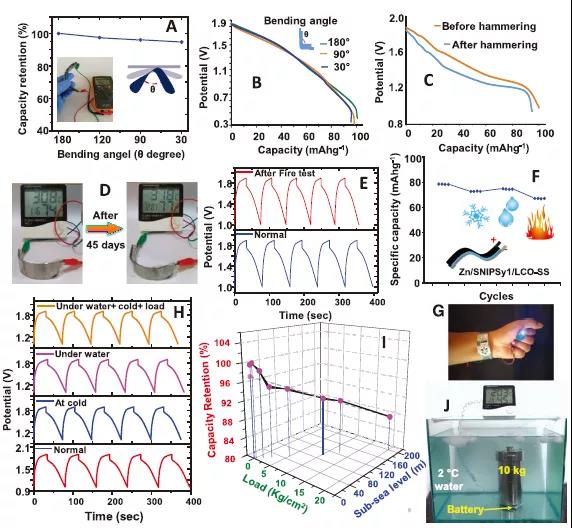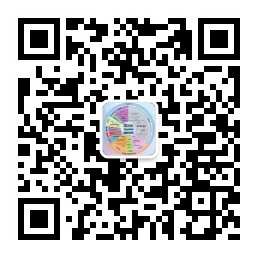 Recently, many hydrogel systems have been designed and studied for soft electronics applications because they have certain advantages compared to batteries composed of liquid electrolytes and separators. The introduction of hydrogel at the interface greatly improves the performance of the negative electrode by maintaining the integrity of the electrode-electrolyte interface and long-lasting mechanical durability, while maintaining sufficient ionic conductivity. In addition, non-flammable and safe electrolyte systems are considered to be one of the main problems of next-generation rechargeable batteries, and hydrogel-based aqueous electrolyte systems can solve these problems. However, in hydrogel-based systems, ion transport is impaired to a certain extent, and the output voltage of hydrogel-based batteries is lower than that of liquid electrolyte-based systems. When the hydrogel system is used as a solid electrolyte in a flexible rechargeable battery for underwater applications, the hydrogel composition needs to have a megapascal tensile strength and modulus value at a very high water content (≥90%). The ultra-high water content of the hydrogel system can simulate the diffusivity and ion transport rate of the liquid electrolyte medium during charge and discharge. In addition, flexibility and sufficient modulus to maintain structural integrity under stress are necessary characteristics for use as an electrolyte without a support layer and for effective operation under high hydrostatic pressure conditions. However, it is well known that the mechanical properties of hydrogels will decrease significantly with the increase of water content. When the water content of the hydrogel system is ≥90 wt%, it is important to achieve the tensile strength and modulus in megapascals. arduous task. It is known that interpenetrating polymer systems (IPS) based on double crosslinks (ionic and covalent) have higher water content and lower tensile properties. Therefore, the supplementary network (SNIPSy) method of the interpenetrating network system is used to improve the tensile performance of IPS while maintaining the water content.
Recently, many hydrogel systems have been designed and studied for soft electronics applications because they have certain advantages compared to batteries composed of liquid electrolytes and separators. The introduction of hydrogel at the interface greatly improves the performance of the negative electrode by maintaining the integrity of the electrode-electrolyte interface and long-lasting mechanical durability, while maintaining sufficient ionic conductivity. In addition, non-flammable and safe electrolyte systems are considered to be one of the main problems of next-generation rechargeable batteries, and hydrogel-based aqueous electrolyte systems can solve these problems. However, in hydrogel-based systems, ion transport is impaired to a certain extent, and the output voltage of hydrogel-based batteries is lower than that of liquid electrolyte-based systems. When the hydrogel system is used as a solid electrolyte in a flexible rechargeable battery for underwater applications, the hydrogel composition needs to have a megapascal tensile strength and modulus value at a very high water content (≥90%). The ultra-high water content of the hydrogel system can simulate the diffusivity and ion transport rate of the liquid electrolyte medium during charge and discharge. In addition, flexibility and sufficient modulus to maintain structural integrity under stress are necessary characteristics for use as an electrolyte without a support layer and for effective operation under high hydrostatic pressure conditions. However, it is well known that the mechanical properties of hydrogels will decrease significantly with the increase of water content. When the water content of the hydrogel system is ≥90 wt%, it is important to achieve the tensile strength and modulus in megapascals. arduous task. It is known that interpenetrating polymer systems (IPS) based on double crosslinks (ionic and covalent) have higher water content and lower tensile properties. Therefore, the supplementary network (SNIPSy) method of the interpenetrating network system is used to improve the tensile performance of IPS while maintaining the water content.

In view of this, Umaprasana Ojha, Rajiv Gandhi Institute of Petroleum Technology, India, synthesized a series of hydrogel compositions using the SNIPSy method and studied the mechanical properties of their relative water content. In addition, in order to demonstrate the effectiveness of the developed hydrogel system as a solid electrolyte, a zinc/lithium ion battery was produced and studied as a proof of concept.

Highlights of the photo article: 1. The tensile strength and Youngs modulus of the developed ion hydrogel are as high as 2 and 1.67 Mpa when the water content is as high as 96%. 2. Using hydrogel impregnated with zinc ions and lithium ions as solid electrolytes, cost-effective, durable and flexible rechargeable batteries can be manufactured. These batteries have minimal capacity loss when immersed in water, deformed, exposed to flame, placed under high loads, and operated under low temperature conditions, indicating the feasibility of their underwater applications. Picture Picture 1 Preparation process picture Picture 2 Application display Original link: https://doi.org/10.1002/adfm.202100251






